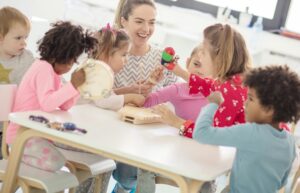Self-Regulation – Why is it so important?
by Jody Pringle, Educational Psychologist at Bellavista School
Self-regulation is “the ability to assert control over what one thinks, feels, and acts upon” (Guderjahn, Stadler & Gawrilow, 2013, p. 397). Several studies have shown that individuals with self-regulatory skills exhibit increased well-being, more fulfilling relationships, and better academic achievement (Guderjahn et al., 2013; Riva & Ryan, 2015). Self-regulation includes being able to control responses to intense feelings such as irritation, excitement, anger, and embarrassment; calm down after an exciting or disturbing event; focus on a task; refocus your attention on a different task, learn to manage urges, and act in ways that help a person get along with other people.
As a child grows, self-regulation helps them make friends as they can take turns in games and conversations, share toys, and express emotions in appropriate ways. Learning at school is optimal with self-regulation as they can sit still and pay attention in the classroom. A child can also act in socially acceptable ways because they are able to control impulses and gain more independence, as self-regulation enables them to decide how to act in different situations, and learn how to do so without as much teacher and parental direction.
Research indicates the ability to self-regulate during the early years of a child’s life are good indicators of how the individual will do in their later years (Riva & Ryan, 2015). Self-regulation is developed during the preschool years (Shiels & Hawk, 2010). Children who learn to understand and control their emotions and impulses early are found to perform better in school, and experience better health and various other benefits in their adult years than children with poor self-regulation (Duckworth & Carlson, 2013). Children develop self-regulation through warm and responsive relationships. They also develop it by watching the adults around them.
Self-regulation starts when children are babies. It develops most in the toddler and preschool years, but it also keeps developing right into adulthood. When babies need a break from attention or are getting fatigued, they may suck their fingers for comfort or turn away from their carers. Toddlers are capable of waiting briefly for food and toys. However, young toddlers may steal items from other kids if they really desire them. And when toddlers are overcome by intense emotions, tantrums occur. Pre-schoolers are beginning to comprehend how to play with other children, and what is expected of them in social situations. A young child could attempt to speak softly, for instance, if you are watching a movie. Children of school going age are becoming more adept at regulating their wants and needs, picturing other people’s viewpoints, and weighing all the options. This suggests, for instance, that they might be able to argue with children without getting into a fight. Teenagers are better at making plans, completing challenging activities, acting appropriately in social situations, and taking other people’s feelings into account.
Throughout literature, it has been well established that learners with Attention Deficit Hyperactivity Disorder (ADHD) often struggle to control themselves properly, and are inattentive, hyperactive, and impulsive. Teachers may describe them in schools as barely listening, easily distracted by peers, calling out without permission or restless (DuPaul & Stoner, 2003). According to Barkley (2003), learners with ADHD do not lack the requisite skills and experience to succeed, but their difficulties with self-regulation prevent them from applying their knowledge and skills when they are needed. As Barkley (2003:79), aptly puts it, “ADHD is more a problem of doing what one knows rather than knowing what to do.”
Here are some practical ways you can help your child learn and practice self-regulation:
Work on your child’s skills for understanding and managing emotions.
Use calming strategies.
Plan for challenging situations where it might be hard for younger children to behave well.
Involve pre-teens and teenagers in problem-solving and negotiating difficult situations.
Praise your child when they show self-regulation and manage a tricky situation.
Try to model self-regulation for your child.
Tiredness, illness and changes to your child’s routine can all affect your child’s ability to regulate their reactions and behaviour. Some children have great self-regulation at school, but find it difficult to self-regulate at home. Other children struggle in busy, noisy places like shopping centres. As children get older, self-regulation might be challenging if they have a lot of assessment tasks or relationship difficulties. Although these problems with self-regulation are fairly typical, it’s a good idea to speak with a professional if you’re worried. For more information, visit www.bellavista.org.za
About Bellavista SHARE
Bellavista S.H.A.R.E. is the Education Resource Centre of Bellavista School, an independent school in Johannesburg that is widely regarded as a centre of excellence in the field of remedial education. With the Bellavista S.H.A.R.E initiative, the school harnesses the collective capacity it holds within its own staff to improve the quality of educational delivery in Southern Africa by sharing its wealth of professional knowledge, experience, and collective expertise with the community of educators and health professionals working with children in the region.




